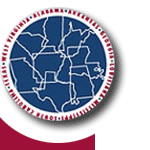
 |
| Home |
| Meet the Team |
| Our History |
| Grantees |
| Our Funding |
| News and Events |
| Library of Documents |
| Regional Forum |
| Links |
Our HistoryThe Southern Rural Access Program began making its first round of grant awards in November 1998. The grant awards followed an intense review by The Robert Wood Johnson Foundation (RWJF) of one proposal from an agency in each of the eight targeted states designated to act on behalf of a broad consortium of agencies interested in improving access to healthcare in rural underserved areas. An additional $2.5 million also was made available to the National Program Office from The Robert Wood Johnson Foundation to fund innovative projects through the 21st Century Challenge Fund, a special opportunities fund designed to support highly innovative pilot demonstrations or small analytic projects that address specific healthcare problems and serve to build capacity within the state. Based on the lessons learned and successes from the first three-year phase of the program, the RWJF Board of Trustees reauthorized the program for another four years in January 2002. Of the $18.9 million in new grants made available by RWJF, $13.3 million was allocated to core grant components, $3.5 million for additional revolving fund seed money and $600,000 for a new effort, the planning of a single regional forum to address healthcare challenges in the rural South. Phase II, Round I grants were awarded for a two-year period beginning April 1, 2002. A second round of two-year funding was awarded April 1, 2004. To encourage sustainability at the end of the Foundation's involvement, the funding level for core grants will be gradually reduced such that the sites will be funding 50% of core grant activities by the fourth year of Phase II. BackgroundProviding rural Americans with access to healthcare services has been a challenge to policy makers, researchers, providers, and rural health advocates for decades. Despite a number of federal and statelevel efforts, many rural areas continue to have fragmented health delivery systems, a shortage of health professionals, inadequate access to capital for health care infrastructure, and high proportions of working poor people without health insurance. However, recent policy changes provide some opportunities to improve access to basic health care in rural areas. Significant among these are changes in federal Medicare policy that provide payment incentives to develop managed care options in rural areas, and that provide an opportunity for providersponsored organizations to participate in the Medicare+ Choice Program. Also, it may now be easier for underserved rural areas to make progress on persistent primary care workforce shortages. Emerging market forces combined with medical education reforms have stimulated significant growth in the number of students who choose careers in primary care, such as generalist physicians, nurse practitioners, physician assistants, and certified nurse midwives. Additionally, support mechanisms are being developed to enhance the capacity of underserved rural areas to recruit and retain more primary care practitioners. The Foundation has supported a number of efforts to improve access to care in rural regions of the country. Key lessons from these experiences indicate that:
Based on these lessons, the Foundation believes that combining promising interventions and working over a sustained period with a regional group of states will provide the best opportunity to improve access to care.
|